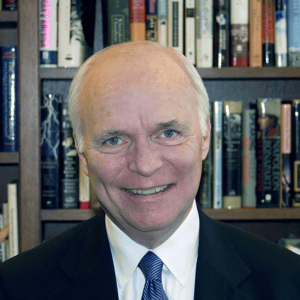Brian Lamb, innovator in the field of mass communications and an iconic figure in the history of American television, has over a period of twenty-five years made C-SPAN into a deservedly celebrated and highly distinctive national institution that Americans cherish as a national treasure.

Brian Lamb. Photo by C-SPAN. Creative Commons Attribution 2.0
With an estimated 28 million viewers: it represents 10 percent of the American viewing public of whom 70 percent of his audience are under the age of 50 and 15 percent under the age of 24. Ninety-nine percent of his viewers vote in elections. Recently Mr. Lamb told Bruce Cole of the National Endowment for the Humanities something more about C-SPAN’S 10 percent share of the national television audience: “They read newspapers. They go to historical events. They watch history on television.”
His program Booknotes, which came to an end on December 5, 2004, after 800 interviews over 15 years, filled an immense void among avid readers of history, biography, and public affairs. The capsulized description of Booknotes reveals its essence: “One Author, One Book, One Hour.” This much-loved Sunday evening program featured such primary sources as Jimmy Carter, Mikhail Gorbachev, Richard Nixon, Helmut Schmidt, and Margaret Thatcher. It was visited, as well, by a seemingly endless procession of scholars representing a range of perspectives that politely might be described as ecumenical in their persuasions. Among them: Joyce Appleby, Blanche Wiesen Cook, John Dower, William Duiker, Eric Foner, Henry Louis Gates, Jr., Stephen Greenblatt, Bernard Lewis, David Levering Lewis, Glenn Loury, Pauline Maier, Harvey Mansfield, James McPherson, Nell Irvin Painter, Richard Posner, Jack Rakove, Edward Said, William Taubman, Abigail Thernstrom, Garry Wills, Alfred Young, and Howard Zinn.
Booknotes also caused Brian Lamb to become an author, including spending some time on the bestseller list of the New York Times. He has acknowledged, more than once, that his roots in Indiana figure into his on-camera methodology. In his own words: “There was a great skepticism in the middle of the country about a lot of things, but yet there was a genuineness about it that you often don’t find on the two coasts.”
Indeed, Mr. Lamb’s origins have contributed significantly to what has come to be regarded as his greatest contribution over the past 25 years: the democratization of American television. Dissatisfied with the similarities of network news, C-SPAN operating on a not-for-profit basis has provided viewers with a genuine alternative. He regards himself—and these are his words—as “a work in progress,” adding that “for the last 25 years [he’s] been involved in this enormous educational process.” While he has modestly professed that even people who watch C-SPAN do not recognize his name, many would counter that such an assumption is indefensible. More than 40 years ago, Newton Minow accurately characterized American television as the “vast wasteland.” But at the beginning of the 21st century, many Americans—including a fair share of the American Historical Association’s membership—rightfully value C-SPAN as an achievement of historic significance. Moreover, today we know that it is he whom the American people must thank as an inspired teacher of history. As such, it is this organization’s high honor to acknowledge Brian Lamb as the second recipient of our Theodore Roosevelt-Woodrow Wilson Award for extraordinary contributions to the study, teaching, and public understanding of history.